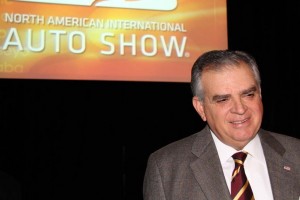(This story has been revised since it was first posted to reflect revisions in wire copy quoting Sec. of Transportation Ray LaHood.)
Even as Toyota struggles to get underway with the repairs to millions of vehicles with potentially sticky accelerators, Washington is taking aim at the embattled automaker, the Secretary of Transportation suggesting the maker is “safety deaf,” while federal regulators begin looking at the possibility electronic control systems on Toyota vehicles could be another cause of “unintended acceleration.”
On Monday, Toyota formally provided details of its repair plans for the latest in a series of safety recalls, announcing that it would begin fixing owners’ sticky accelerators later this week. The automaker also insisted that safety is its number one priority, that it had acted quickly and reasnably, and that it was confident it had identified all the problems with its vehicles.
But in an interview with the Associated Press, Secretary of Transportation Ray LaHood had sharp words for Toyota, suggesting that it took longer than necessary to get the automaker to respond to mounting reports of problems with so-called “unintended acceleration,” an issue that also prompted the recall of 3.8 million vehicle for “carpet entrapment,” last October.
Using the phrase, “safety deaf,” several times, LaHood said the National Highway Traffic Safety Administration could not get action out of Toyota initially. The AP corrected an earlier report, however, stating that the company’s American arm understood the problem but that the government had to press hard to get the company’s Japanese executives to act.
“They should have taken it seriously from the very beginning when we first started discussing it with them,” LaHood told the wire service. “Maybe they were a little safety deaf. He added that if Japanese officials didn’t budge, “I don’t know if the recall would be taking place.”
There have been a number of harsh questions, along the lines of who knew what when, raised in recent days about Toyota’s actions, and NHTSA’s lack of action. Jim Lentz, President of Toyota Motor Sales USA, on Monday argued the automaker acted with necessary haste once it received several credible reports of problems with sticking accelerators, last October, about the same time the carpet entrapment recall was announced.
But there have been some potential conflicts in Toyota statements. Back in October, the automaker insisted that unintended acceleration problems were solely the result of pedals being entrapped by loose floor mats, Vice President Bob Carter declaring that anyone pointing to other possible causes was engaging in “unwarranted speculation.”
During the Monday news conference, Lentz and other Toyota officials took a similar stand. Though they now admit that a faulty accelerator design could cause problems, they vociferously rejected claims that faulty computer controls could be another issue.
“In terms of electronics, we’ve been extensively testing and found no evidence of problems,” assured Lentz.
But reports of just such problems have been mounting. As TheDetroitBureau.com reported, today, Steve Wozniak, a co-founder of Apple and one of the pioneers of the personal computer, said he has been trying to advise Toyota of a computer glitch that can cause his 2010 Prius to “go wild.” “Woz” said he has been unable to reach anyone at Toyota interested in hearing about the issue.
But it appears federal regulators aren’t done with Toyota. In a separate statement, Secretary LaHood cautioned, “We’re not finished with Toyota and are continuing to review possible defects and monitor the implementation of the recalls.”
Separately, Automotive News reported that an unnamed source at the Depatment of Transportation said, “Yes,” when asked by e-mail if its investigators are considering electrical gremlins.
Toyota has been struggling to retain what’s left of its once-sterling image. Along with the Monday mornng news conference, it made Lentz available to a variety of major media outlets, including NBC’s Today Show. And, today, it is running ads in a number of U.S. newspapers stating, in part, “We know what’s causing this and what we have to do to fix it.”
With more questions being raised about that assertion, it is beginning to look like the safety firestorm won’t be contained anytime soon.
Responding to today’s fast-moving events, Toyota officials issued a terse statement, saying, “Nothing is more important to us than the safety and reliability of the vehicles our customers drive. Since these issues first came to our attention, we have understood that the soonest possible action would be in the best interests of our customers and have acted accordingly. We are very grateful for the advice of all the government agencies involved and feel that through our handling of the recall we have a chance to regain the trust of our customers. We will continue to cooperate fully with NHTSA on all vehicle safety issues.”

